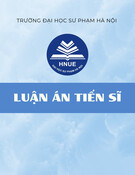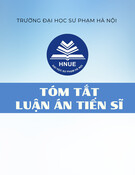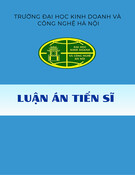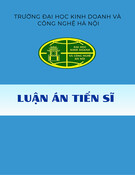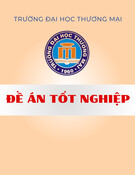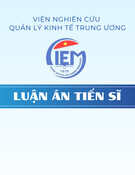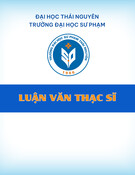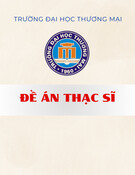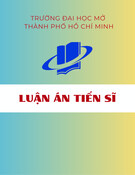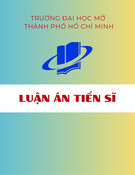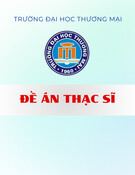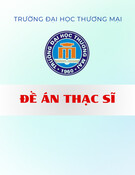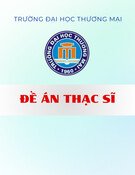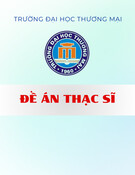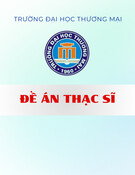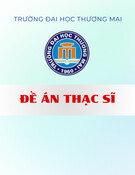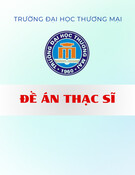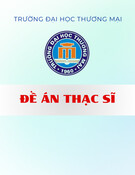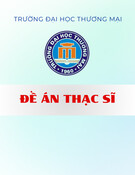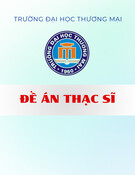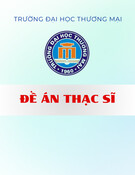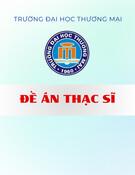
MINISTRY OF EDUCATION AND TRAINING
HANOI NATIONAL UNIVERSITY OF EDUCATION
PHAM DAC THI
MANAGING TEACHING ACTIVITIES FOR THE
GENERAL EDUCATION SUBJECT SECTOR AT
ARTS UNIVERSITIES TOWARDS QUALITY
ASSURANCE
Major: Educational management
Code: 9.14.01.14
SUMMARY OF EDUCATION SCIENCE DISSERTATION

HA NOI - 2021
The thesis is completed at:
Hanoi National University of Education
Supervisor: Assoc. Prof. Nguyen Van Le
Review 1: ...............................................................................
................................................................................................
Review 2: ...............................................................................
................................................................................................
Review 3: ...............................................................................
................................................................................................
The thesis will be defensed at the University Level Thesis Assessment
Council of Hanoi National University of Education
At … ’ date … moth … year 2021
The thesis can be searched at:
- National Library
- Hanoi National University of Education Library

INTRODUCTION
1. Background to the study
Higher education is a comprehensive education under a closed model,
including basic knowledge education, basic professional knowledge and specialized
knowledge, among which basic knowledge is the foundation, the initial basis for
students to be able to acquire and acquire basic professional knowledge and
specialized knowledge in a systematic and scientific manner. General education
knowledge sector includes subjects that focus on such foundational values.
Currently, in the context of higher education innovation, there are high
requirements for teaching management, including teaching management in general
education knowledge sector. The reality shows that the teaching management of
the general education knowledge sector still has many shortcomings, the core
problem is that there is no most effective approach. Up to now, there has been no
research on the management of teaching activities in the general education
knowledge sector at Arts universities.
With the above reasons, the author has chosen the problem: "Teaching
management of general education knowledge sector at Arts universities in the
direction of quality assurance" as the thesis topic.
2. Research aims
On the basis of theoretical research and management situation, some solutions
to teaching management of the general education knowledge sector at Arts
universities towards quality assurance have been proposed.
3. Variables and Subjects of the research
3.1. Variables
Teaching activities for general education subjects at Arts universities.
3.2. Subjects of the research
Teaching management of the general education subjects in the direction of
ensuring the quality at Arts universities.
4. Scientific hypothesis
Managing the teaching activities for general education subjects at Arts
universities has achieved certain results. However, the current management of
teaching activities for general education subjects at Arts universities is still
inadequate for many different reasons. Therefore, if the correct reasons for proposing
and implementing the measures to manage teaching activities for general education
subjects at Arts universities can be detected in a reasonable and feasible manner in
the direction of quality assurance, it will increase the quality of teaching the general
education subjects and contribute to improving the quality of Arts training at Arts
universities.
5. Research missions
Building a theoretical basis; Evaluating the teaching situations and the
management of teaching activities for general education knowledge subjects; Proposing
1

the measures to manage teaching activities teaching subjects towards ensuring the
quality at Arts universities
Experimenting and testing the measures to manage teaching activities teaching
subjects towards quality assurance at Arts universities.
6. Limitation and scope of the study
6.1. Content Limit
The dessertation focuses on studying the measures to manage teaching activities for
general education subjects towards ensuring the quality according to the principals of Arts
universities to meet the requirements of Artsistic education renovation.
6.2. The survey region and time limit
Research on the management of teaching activities of the lecturers who teach
general education subjects and students' learning activities (formal university system)
in 2 Arts universities, they are: Hanoi Academy of Theatre and Cinema; Ho Chi
Minh Academy of Theatre and Cinema;
7. Research methods
- Approaches: The thesis used a number of approaches as follows: System
approach, Process approach, Complex approach, Capability approach, quality
assurance processing Approach
- Specific Research Methods: Theoritical Research Methods, practical research
methods, Investigation and survey method, Interview method, Information processing
method group, Experimental method
8. Theoritical points of the thesis
(1) Managing teaching activities for general education subjects towards quality
assurance is one of the core factors to improve the quality of higher education in
order to meet the requirements of modern higher education innovation.
(2) Teaching management of general education knowledge sector in the
direction of quality assurance needs to have a synchronous impact on the elements
constituting teaching activities: teaching objectives, teaching contents, teaching
methods; teaching curricula; capacity of the teaching staff, attitude and motivation of
students, testing and evaluation of the teaching process towards quality assurance.
(3) These inadequacies and shortcomings are evident in the stages of teaching
planning and management; determine training objectives, methods, contents and
innovate training programs; the work of fostering to improve the capacity of lecturers
as well as building a teaching environment; The approach to managing teaching
activities of general education subjects is not suitable. Therefore, properly assessing
the current situation of teaching activities, managing teaching activities of subjects in
the general education subjects will be the core basis for building measures to manage
teaching activities for the general education subjects.
(4) Developing a set of criteria and indicators to assess the output quality of
teaching activities in the general education knowledge sector according to the
competency approach is necessary to take that as a goal and a measure of the
teaching management process of the general education knowledge sector towards
2

quality assurance.
(5) Teaching management of the general education knowledge sector to ensure
quality contributes to creating a solid foundation of scientific theory for students of
universities in general, including Arts universities in order to improve the overall
their teaching quality as well as the effectiveness of Artsistic creation.
9. New contributions of the dessertation
- The dissertation clarifies the theoretical framework for managing teaching
activities for general education subjects of at Arts universities in the direction of
ensuring quality in terms of contents, forms, methods, and organization, and
teaching results.
- The dissertation conducted a survey to evaluate the overall situation of
teaching and managing teaching activities for teaching general education subjects at
Arts university, the main causes of the current situation.
- From the thesis research, based on the analysis of the current situation, the
thesis has proposed and conducted experiments to confirm the reality and feasibility
of the measures to manage teaching activities in teaching general education subjects
at Arts universities in the direction of ensuring quality so that they can be applied in
practice.
10. The organization of the thesis
In addition to the Introduction, Conclusions and Recommendations, References
and Appendices, the thesis has 3 chapters:
Chapter 1: Theoretical background on managing teaching activities for the
general education subject sector at Arts universities towards the quality assurance;
Chapter 2: Practical background for managing teaching activities for the
general education subject sector at Arts universities;
Chapter 3: Measures for managing teaching activities for the general education
subject sector at Arts universities towards quality assurance.
Chapter 1
THEORETICAL BACKGROUND ON MANAGING TEACHING
ACTIVITIES FOR THE GENERAL EDUCATION SUBJECT SECTOR
AT ARTS UNIVERSITIES TOWARDS THE QUALITY ASSURANCE
1.1. Literature review
1.1.1. Research on teaching and teaching activities management
Regarding teaching management, such foreign authors as Muhammad Abdul
Malik, Dr. Ali Murtaza, Dr. Abdul Majeed Khan ... or such indoor authors as Pham
Minh Hac, Tran Nguyen Ngoc Quang, Thai Duy Tuyen ... all think that teaching
activities are the interaction between the teacher's teaching activities and the students'
learning activities in order to achieve the set teaching goals through the implementation
of teaching methods, forms of teaching organization and teaching objectives ...
3

